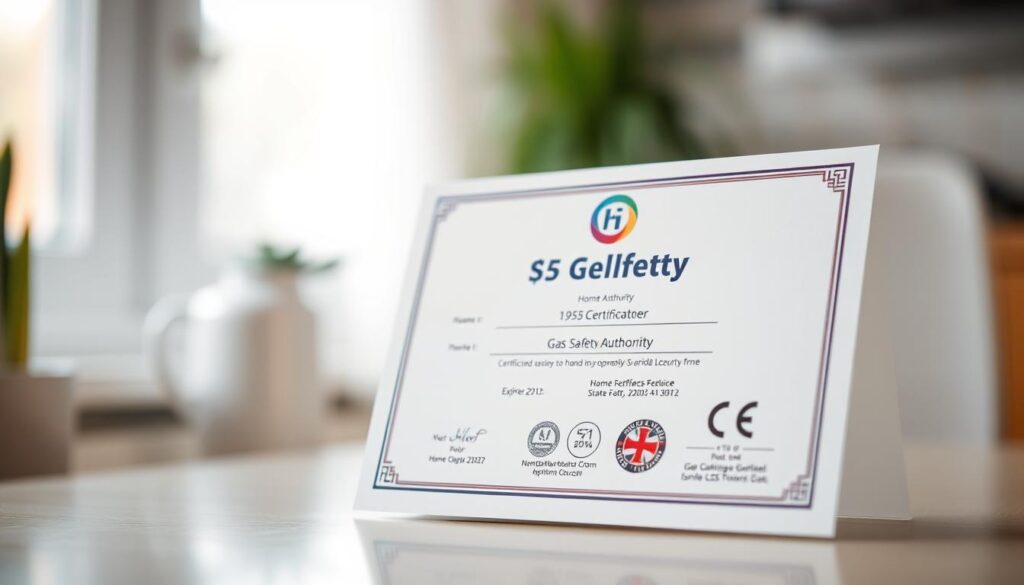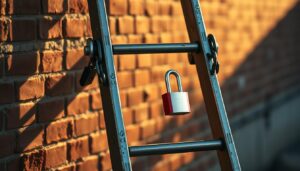Are you aware of the potential risks associated with gas appliances in your home?
Gas is an essential component of modern living, providing heating, hot water, and cooking facilities. However, it can be hazardous if not properly maintained. The UK authorities have implemented the “Gas Safety (Installation and Use) Regulations 1998″ to mitigate these risks.
Understanding how to verify your gas safety certificate is crucial for ensuring your family’s safety and complying with UK regulations. A gas safety certificate is a vital document that confirms your gas appliances have been professionally inspected and deemed safe for use.
Key Takeaways
- Verify the authenticity of your gas safety certificate to ensure compliance with UK regulations.
- Understand the importance of regular gas appliance inspections for your family’s safety.
- Know what actions to take if you cannot locate your gas safety documentation.
- Recognise the role of gas safety certificates in maintaining a safe living environment.
- Be aware of the potential risks associated with unmaintained gas appliances.
Understanding Gas Safety Certificates
To maintain a safe living environment, it’s essential to comprehend what a gas safety certificate entails. A gas safety certificate is a document that confirms your gas appliances and installations are safe to use.
What is a Gas Safety Certificate?
A gas safety certificate is issued after a Gas Safe registered engineer inspects your gas appliances and installations. This certificate is crucial as it ensures that your gas appliances are functioning properly and do not pose a risk to your safety.
Legal Requirements in the UK
In the UK, the Gas Safety (Installation and Use) Regulations 1998 make it a legal requirement for landlords to maintain gas appliances in a safe condition and obtain an annual gas safety certificate. Landlords must provide tenants with a copy of the current certificate within 28 days of the inspection for new tenancies or within 48 hours upon request for existing tenancies.
| Responsibility | Description | Timeline |
|---|---|---|
| Landlords | Provide tenants with a copy of the Gas Safety Certificate | Within 28 days for new tenancies, 48 hours upon request for existing tenancies |
| Tenants | Verify the authenticity of the Gas Safety Certificate | Upon receipt of the certificate |
| Gas Safe Engineers | Conduct gas safety inspections and issue certificates | Annually, within 10-12 months of the previous inspection |
The Importance of Valid Gas Safety Certificates
The importance of a valid gas safety certificate cannot be overstated, as it protects you from potential gas-related hazards. Ensuring that your landlord has obtained a valid gas safety certificate is crucial when renting a property.
Protecting Your Health and Safety
A valid gas safety certificate is essential for safeguarding your health and well-being. It confirms that all gas appliances have been inspected and are safe to use, reducing the risk of gas leaks, explosions, or carbon monoxide poisoning.
- Regular inspections help identify potential issues before they become major hazards.
- Certification ensures that gas appliances are functioning correctly and safely.
Legal Compliance for Landlords and Tenants
For landlords, maintaining a valid gas safety certificate is a legal obligation under UK law. Failure to comply can result in severe penalties, including prosecution and unlimited fines.
| Responsibility | Legal Requirement |
|---|---|
| Landlords | Annual gas safety inspections and provision of certificates to tenants. |
| Tenants | Right to request and receive a copy of the current gas safety certificate. |
Tenants have the right to request a copy of the gas safety certificate, empowering them to ensure their living environment meets legal safety standards.
Who Can Issue a Gas Safety Certificate?
To verify the authenticity of a Gas Safety Certificate, it’s essential to understand who can issue it. In the UK, only Gas Safe registered engineers are qualified to inspect gas appliances and issue these certificates.
Gas Safe Registered Engineers
A Gas Safe registered engineer is a professional who has the necessary qualifications and training to work on gas appliances safely. These engineers are registered with the Gas Safe Register, which is the official gas registration body in the UK. To ensure an engineer is registered, you can check their ID card, which should display their name, photo, and registration number.
Verifying Engineer Credentials
Before allowing an engineer to inspect your gas appliances, always verify their credentials. Check their Gas Safe ID card carefully, and visit the Gas Safe Register website to confirm their registration. You can also use the online checking tool to verify if a business is registered and see the names of all registered engineers working for that company.
By following these steps, you can ensure that your Gas Safety Certificate is issued by a competent and registered engineer, providing you with peace of mind and ensuring your gas appliances are safe to use.
What Information is Included in a Gas Safety Certificate
A Gas Safety Certificate contains crucial information about the safety and compliance of gas appliances in your home. This document is issued after a thorough inspection by a Gas Safe registered engineer, ensuring that your gas appliances are safe to use.
Essential Certificate Details
The certificate includes vital details such as the address of the property, the date of the inspection, and the name and registration number of the Gas Safe engineer who performed the check. It also lists all the gas appliances inspected, along with their condition and any defects or issues identified during the inspection. As emphasized by a Gas Safe engineer, “Accuracy and completeness are key when it comes to the information recorded on a Gas Safety Certificate.”
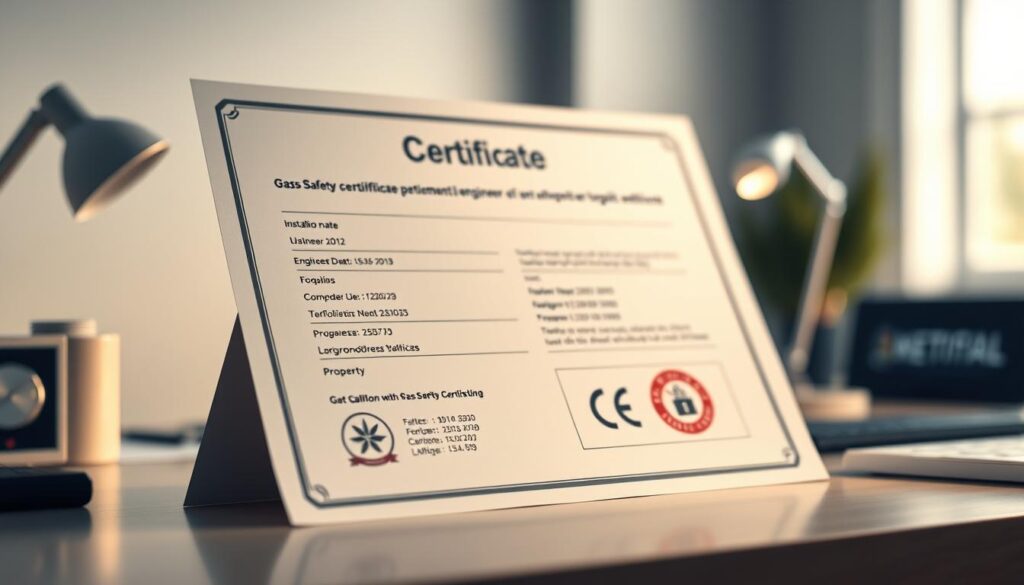
Validity Period and Renewal Requirements
A Gas Safety Certificate is valid for 12 months from the date of inspection. To remain compliant, it needs to be renewed annually. Landlords can arrange for a new inspection up to two months before the current certificate expires, retaining the original expiry date. This process is often referred to as ‘MOT-style’ servicing. It’s recommended to set up automatic reminders for certificate renewal to avoid any gaps in certification. When renewing, the same comprehensive checks are performed as with the initial inspection. Keeping a record of previous certificates is also advisable, as UK regulations require landlords to maintain records for at least two years.
- The certificate clearly displays both the date of inspection and the expiry date.
- Landlords can have a new gas safety check performed up to two months before the current certificate expires.
- Digital certificate management systems are increasingly popular for tracking validity periods and automating the renewal process.
By understanding what’s included in a Gas Safety Certificate, you can ensure that your gas appliances remain safe and compliant with UK regulations.
How to Check Gas Safety Certificate at Home
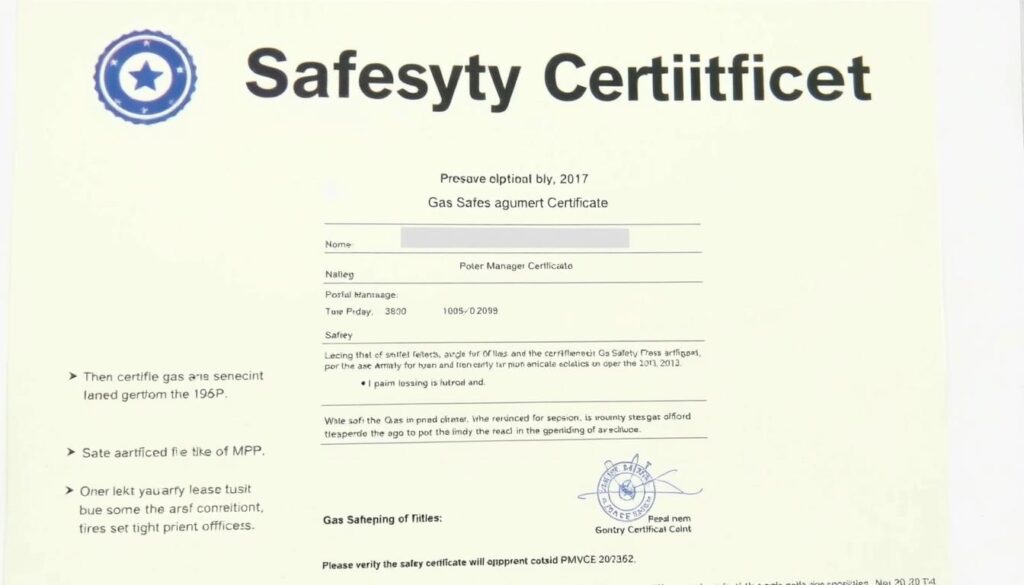
Checking your gas safety certificate at home is a straightforward process that ensures your safety and compliance with UK regulations. You can verify the authenticity and validity of your certificate through either physical document inspection or digital certificate verification.
Physical Document Inspection
When inspecting a physical gas safety certificate, ensure it contains the Gas Safe Register logo, the engineer’s details, and property information. Check that the certificate is not damaged or tampered with. You should also verify the certificate’s unique reference number with the Gas Safe Register if needed.
Digital Certificate Verification
Digital gas safety certificates are becoming increasingly common and can be verified at home through several secure methods. Check that the digital certificate comes from a legitimate email address associated with the Gas Safe registered business. You can also log in to online portals provided by some Gas Safe registered businesses to view and download your current and previous gas safety certificates.
By following these steps, you can ensure that your gas safety certificate is valid and up-to-date, providing you with peace of mind and compliance with UK safety regulations.
Landlord and Tenant Responsibilities
Gas safety is a shared responsibility between landlords and tenants, with specific obligations for each. Ensuring the safety of a rental property involves understanding these responsibilities.
Landlord Obligations for Gas Safety
Landlords are responsible for maintaining gas appliances they provide in the rental property. They must ensure that a valid gas safety certificate is issued annually by a Gas Safe registered engineer. This certificate confirms that gas appliances are safe to use.
Tenant Rights and Responsibilities
Tenants have the right to request and receive a copy of the current Gas Safety Certificate for their rental property. They should report any concerns about gas appliances to their landlord immediately. Tenants are also responsible for maintaining any gas appliances they’ve brought into the property themselves and should never block ventilation points for gas appliances.
| Responsibility | Landlord | Tenant |
|---|---|---|
| Maintaining Gas Appliances | For appliances provided by the landlord | For appliances brought in by the tenant |
| Gas Safety Certificate | Must provide a valid certificate annually | Should request and review the certificate |
| Reporting Concerns | Must address gas safety concerns | Should report concerns to the landlord |
What to Do If You Can’t Find Your Gas Safety Certificate
If you’re unable to locate your gas safety certificate, there are several steps you can take to resolve the issue. First, it’s essential to conduct a thorough search of your personal records and document storage locations.
Searching Your Personal Records
Begin by checking files where you keep other property-related documents such as your tenancy agreement, inventory list, or utility bills. Look through email folders, particularly those containing correspondence with your landlord or property management company, as certificates are often sent electronically.
- Check digital storage locations including cloud storage services and downloaded files folders.
- Look through any home maintenance folders or files where you might have stored information about property inspections or servicing.
- If you’ve recently moved, check through any boxes of paperwork that haven’t yet been fully unpacked or organised.
Contacting Your Landlord
If you still can’t find your gas safety certificate, contact your landlord or property manager. They may have a copy of the certificate or be able to provide guidance on how to obtain a replacement.
| Action | Description |
|---|---|
| Contact Landlord | Reach out to your landlord for a copy of the certificate or guidance. |
| Check Digital Records | Search email folders and digital storage for the certificate. |
| Reaching Out to the Gas Safety Engineer | If the landlord can’t help, contact the gas safety engineer who issued the certificate. |
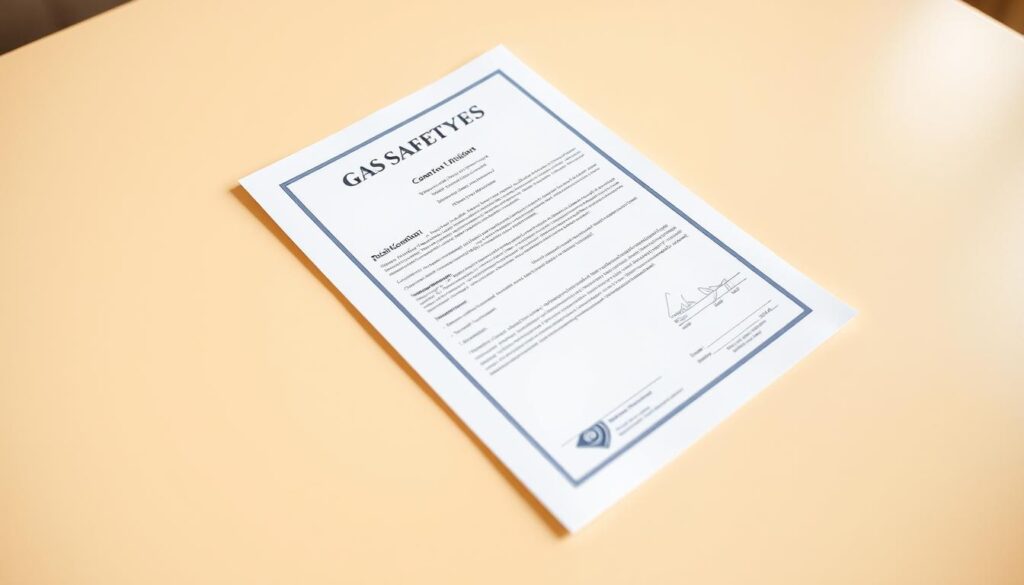
By following these steps, you should be able to locate or replace your gas safety certificate, ensuring you have the necessary documentation for your property.
Obtaining a Duplicate Gas Safety Certificate
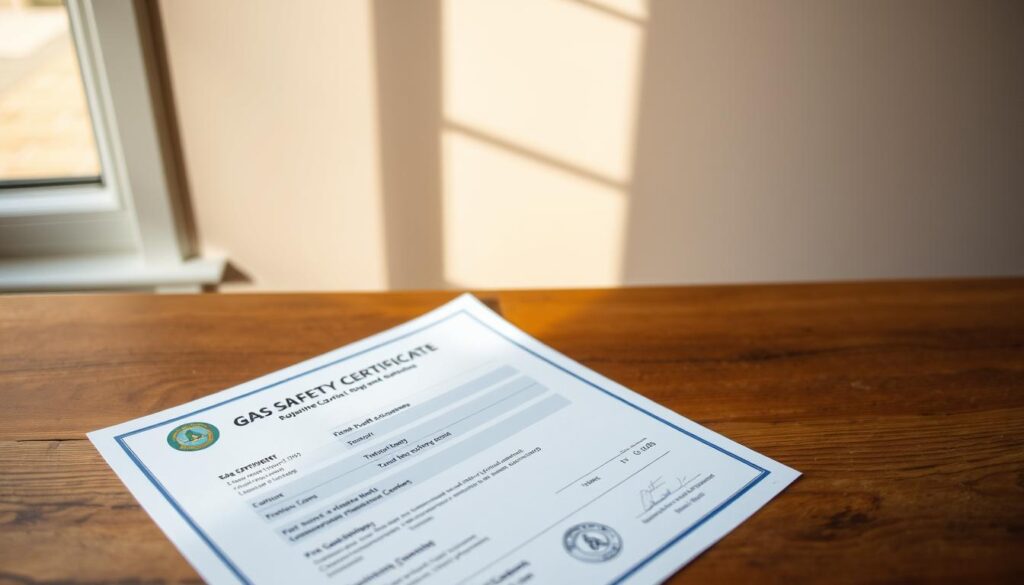
If you’ve misplaced your gas safety certificate, don’t worry, obtaining a duplicate is relatively simple. Losing this crucial document can be stressful, but there are straightforward steps you can take to get a replacement.
Contacting the Original Engineer
The first step in obtaining a duplicate gas safety certificate is to contact the engineer who conducted the original inspection. They will have a record of the work done and can provide a duplicate certificate upon request.
Alternative Methods for Obtaining Duplicates
If you can’t reach the original engineer, you can contact the Gas Safe Register directly or other Gas Safe registered businesses for assistance. They may be able to provide a duplicate certificate or guide you on the next steps.
Costs and Timeframes
The cost of a duplicate gas safety certificate typically ranges from £15 to £50, depending on the service provider. The timeframe can vary, with some engineers offering same-day service and others taking up to 5-10 working days.
To avoid future costs and delays, consider setting up a digital filing system for your important property documents, including your gas safety certificate.
Conclusion
Checking your Gas Safety Certificate at home is a simple yet vital process for your safety. It’s a crucial step in ensuring the well-being of everyone in your property. By understanding what information should be included in a valid certificate, you can verify its authenticity and ensure compliance with UK regulations.
Regular gas safety checks and proper certification are not just legal requirements but vital safeguards against potentially fatal hazards. Maintaining organised records of your Gas Safety Certificates, whether digital or physical, saves time, money, and potential stress in the future. By prioritising gas safety through proper certification and awareness, you can protect your home and loved ones.
